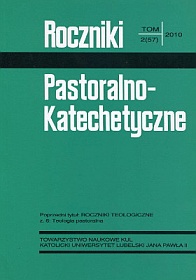A Single-Parent Family and Its Influence on Child Upbringing
Abstract
Raising children in single-parent families has been recognized as a serious problem which results in the situation where single parents (except for families where the absence of either parent is caused by their death) find themselves in conflict with the Catholic teaching on marriage. The situation influences the functioning of the family and the way the offspring are raised.
The categories of single-parent families show certain similarities in the ways of their functioning. It is important to notice that in the single-parent families of unmarried people there appears to be significant lack of the emotional bond between the child and the absent parent. It is unique in such a group of families not to allow the presence of the other parent, mostly the father. In most cases the single parent who raises the child creates a negative image of the absent parent. In case of divorce, the excluded parent is deprived of the possibility to positively influence his or her own children. In fateful situations, it is death that excludes one of the parents from the family life.
In order to prevent creating single-parent families we should take care of forming personal culture and the proper choice of a partner who will aim at setting up a full family. The partners who are going to set up a family should be taught how to be responsible for their life decisions and for the members of their families. The future parents should set up their full families in a mature and wise way because only such full families can be an ideal place for upbringing the child and for preparing him or her for their life in society.
References
Dyczewski L.: Rodzina społeczeństwo państwo. Lublin: TN KUL 1994 s. 131-132.
Graniewska D., Krupa K., Balcerzak-Paradowska B.: Samotne matki, samotni ojcowie. O rodzinach niepełnych w Polsce. Warszawa: Instytut Wydawniczy Związków Zawodowych 1986.
Gręźlikowski J.: Przed nami małżeństwo. Wrocław: Wydawnictw Duszpasterstwa Rolników 2002.
Góralski W.: Problem dostępu do sakramentów świętych osób żyjących w małżeństwach pozasakramentalnych. W: Małżeństwo i rodzina w świetle nauki Kościoła i współczesnej teologii. Red. A. Szafrański. Lublin 1985 s. 323-343.
Katechizm Kościoła Katolickiego. Poznań: Pallottinum 1994.
Kawula S.: Struktura rodziny. W: Pedagogika rodziny. Red. S. Kawula, J. Brągiel, A.W. Janke. Toruń 2002 s. 328-329.
Kawula S.: Świadomość wychowawcza rodziców. Toruń 1975.
Kodeks rodzinny i opiekuńczy. Kodeks postępowania cywilnego. Zakamycze 2003.
Krupa K.: Gdy umiera jedno z rodziców. W: D. Graniewska, K. Krupa, B. Balcerzak-Paradowska. Samotne matki, samotni ojcowie. O rodzinach niepełnych w Polsce. Warszawa: Instytut Wydawniczy Związków Zawodowych 1986 s. 106-143.
Ostoja-Zawadzka K.: Żałoba w rodzinie. W: Wprowadzenie do systemowego rozumienia rodziny. Red. B. de Barbaro. Kraków: Wydawnictwo Uniwersytetu Jagiellońskego 1999 s. 91-96.
Pielkowa J.: Rodzina samotnej matki jako środowisko wychowawcze. Katowice: Uniwersytet Śląski 1983.
II Polski Synod Plenarny (1991-1999). Poznań: Pallottinum 2001.
Półtawska W.: Rola rodziców w wychowaniu seksualnym młodzieży. W: Wychowanie w rodzinie chrześcijańskiej. Red. F. Adamski. Kraków: Wydawnictwo Apostolstwa Modlitwy 1982 s. 324-339.
Tyszkowa M.: Badania psychologiczne wewnątrzrodzinnej socjalizacji. Implikacje praktyczne. W: Badania nad rodziną a praktyka społeczna. Red. Z. Tyszka. Poznań: Wydawnictwo Naukowe UAM 1991 s. 79-90.
Ziemska M.: Rodzina a osobowość. Warszawa 1975.

